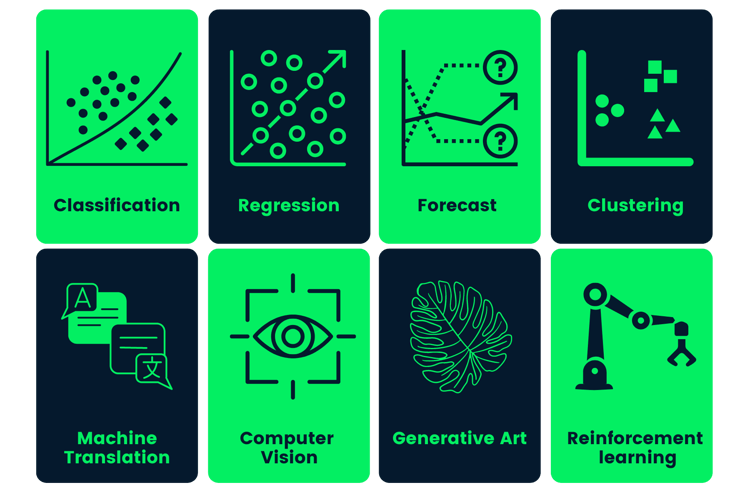When you've gained a good understanding of basic Java programming, it's always better to work with projects to help solidify your learning. In fact, these projects can (and should) be done by anyone—from beginner to advanced.
This blog post will guide you through some ideas for starting your own Java projects across experience levels while also showcasing some tools and resources that might be useful in crafting these projects. If you're totally new to Java, it's worth checking out our Introduction to Java course to get a handle on the basics.
Beginner Java Projects
Firstly, let's have a look at some beginner projects you can work on in Java. These projects tend only to use a few classes and do not require extensive knowledge of the language.
Here are some project ideas to get you started:
1. Build a Basic calculator
In this project, you'll create a basic calculator that can perform simple arithmetic operations like addition, subtraction, multiplication, and division. This project will help you familiarize yourself with variables, conditional statements, and user input.
Some common variations of this project can include adding more operations or implementing a GUI (graphical user interface).
Here’s how the GUI of a calculator can look like:
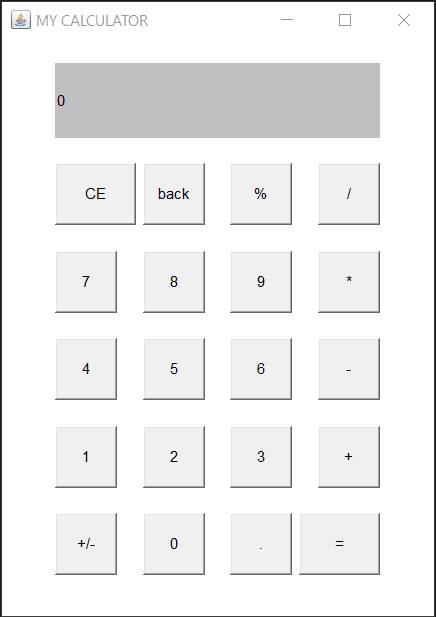
Source: Creating a Calculator using Java AWT by Rohit Kumar
Here are some variation examples of a calculator:
- Scientific calculator
- Tip calculator
- Unit converter
2. Create a currency converter
Based on the same arithmetic concepts of building a simple calculator, you can do a more applicable but simple currency converter. You can use the current exchange rates to convert one currency into another. This project will also allow you to work with external APIs and improve your data-handling skills.
You can try using the Exchange Rate API or Currencylayer API to get relevant currency rates for your project.
3. Make a to-do list application
A to-do list is a practical project that can be used in your daily life. In this project, you'll create an application where users can add tasks to do and mark them as completed when done. This project will introduce you to concepts like arrays, loops, and data structures such as lists.
Some potential features you can include in your to-do list app are:
- Adding deadlines or due dates for each task
- Categorizing tasks into different sections (e.g., work, personal, school)
- Setting reminders for upcoming tasks
Intermediate Java Projects
Java projects aren't just for beginners, too. If you're moderately confident in your command of Java, then intermediate projects are for you. They can help test your skills and encourage you to look for novel solutions to problems.
Have a look below for some intermediate Java project ideas:
4. Create a library management system
In this project, you'll develop a system for managing books in a library. This project will help you work with complex data structures and practice object-oriented programming concepts like inheritance, encapsulation, and polymorphism.
Here's an example interface of a library system created by Haris on GitHub:
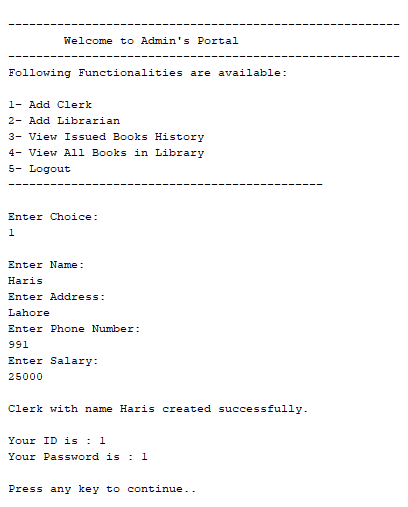
Some potential features to include in your library management system are:
- Adding new books to the library catalog
- Tracking borrowed and returned books
- Generating reports of popular or overdue books
5. Build a simple search engine
A simple search engine is a useful project to practice string manipulation, sorting algorithms, and data organization. You'll also learn how to use two APIs: Crawl API and Search API.
In this project, you'll create a program that can take in user queries and return relevant results from a pre-defined set of documents.
Some potential features to include in your search engine are:
- Option for advanced searching (e.g., exact phrase match, boolean operators)
- Sorting results based on relevance or date
- Displaying snippets of text from the document containing the query terms
6. Make a chat application
Creating a simple chat application is a fun and challenging project that can help you master concepts like networking, multi-threading, and event-driven programming.
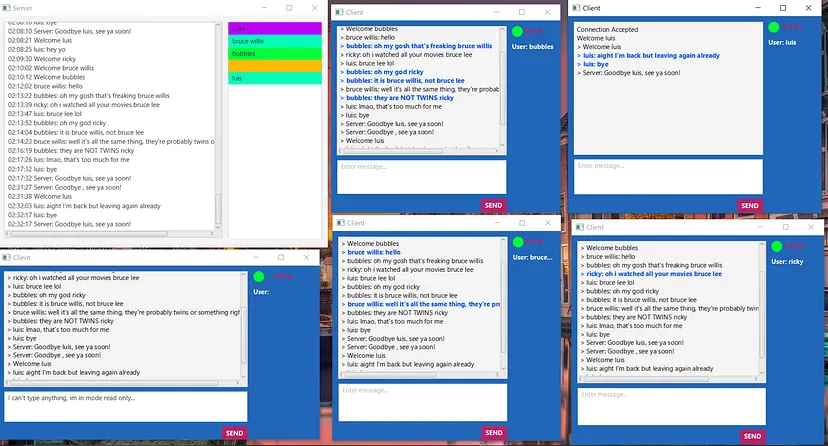
You can try building a text-based chat application first, then move on to implementing features like file sharing or group chats.
Here's a good guide on using JavaFX for building a chat application.
Some libraries that might be useful for this project are:
7. Build an inventory management system
This project involves creating a system for managing inventory in a store or warehouse. You'll need to work with databases and design data models to keep track of products, quantities, and prices. You'll also learn about CRUD operations (create, read, update, delete) when interacting with the database using SQL.
Some features you can include in your inventory management system are:
- Adding new products to the inventory
- Updating product quantities and prices
- Generating reports on sales and stock levels
This can be a useful project for anyone looking to become a database administrator or data scientist as knowledge of SQL is essential in these roles.
Advanced Java Projects
Advanced projects might take longer to complete but are more complex and resemble real-life examples of code you might encounter in the industry.
Here are some advanced Java project ideas to challenge yourself:
8. Create an e-commerce shopping system
In this project, you'll develop a full-fledged e-commerce platform where users can browse products, add items to their cart, and check out using different payment methods. This project will test your knowledge of object-oriented design patterns and data structures.
Some features you can include in your online shopping system are:
- User authentication and authorization
- Product reviews and ratings
- Order tracking and history
9. Build a web scraping application
Web scraping is the process of extracting data from websites. In this project, you'll create a program that can scrape data from multiple websites and store it in a database for later use. This project will help you improve your knowledge of networking, APIs, and databases.
Some potential features to include in your web scraping application are:
- User input for specifying which websites to scrape
- Data cleaning and formatting for consistent storage
- Scheduling options for regular updates or automatic scrapes
10. Create a job portal website
A job portal website is a platform where employers can post job listings, and applicants can apply for them. In this project, you'll develop a website that allows users to create accounts, search for jobs, and submit applications. This project will help you practice web development skills like HTML, CSS, and JavaScript.
Some features you can include in your job portal website are:
- Job listing search with filters (e.g., location, industry)
- User profile creation and management
- Resume submission for applications
You can model your job portal interface after these established job portal sites:
Indeed, Glassdoor, or LinkedIn Jobs.
11. Develop a criminal face detection system
In this project, you'll develop a system that can detect faces from security camera footage and identify potential criminals based on an existing database of known offenders. This project will require knowledge of computer vision techniques, data structures for image processing, and machine learning algorithms.
Some features you can include in your criminal face detection system are:
- Face recognition and matching using deep learning models
- Regular updates of the offender database through scraping or manual entry
Java Project Ideas for Resume or Portfolio
Learning Java can bring you many career opportunities, such as becoming a software developer, web developer, or data scientist.
Here are some project ideas that will showcase your skills to potential employers and make your resume or portfolio stand out:
12. Mobile app development projects
With the rise of smartphones, mobile app development has become a lucrative field. Java is the primary language for Android app development, making it an excellent choice for mobile projects. You can create innovative and user-friendly apps that cater to various needs and industries.
For a more diverse portfolio, you can try mobile applications across various use cases, such as:
- A fitness tracker app for tracking workouts and nutrition
- A language learning app with interactive games and quizzes
- A personal finance app for budgeting and expense tracking
13. Data analysis and visualization project
Data analysis is a crucial skill in today's data-driven world. In this project, you'll work with large datasets and use Java libraries like Apache Spark or Hadoop to process and analyze the data. You can then create visualizations using libraries like D3.js to present your findings.
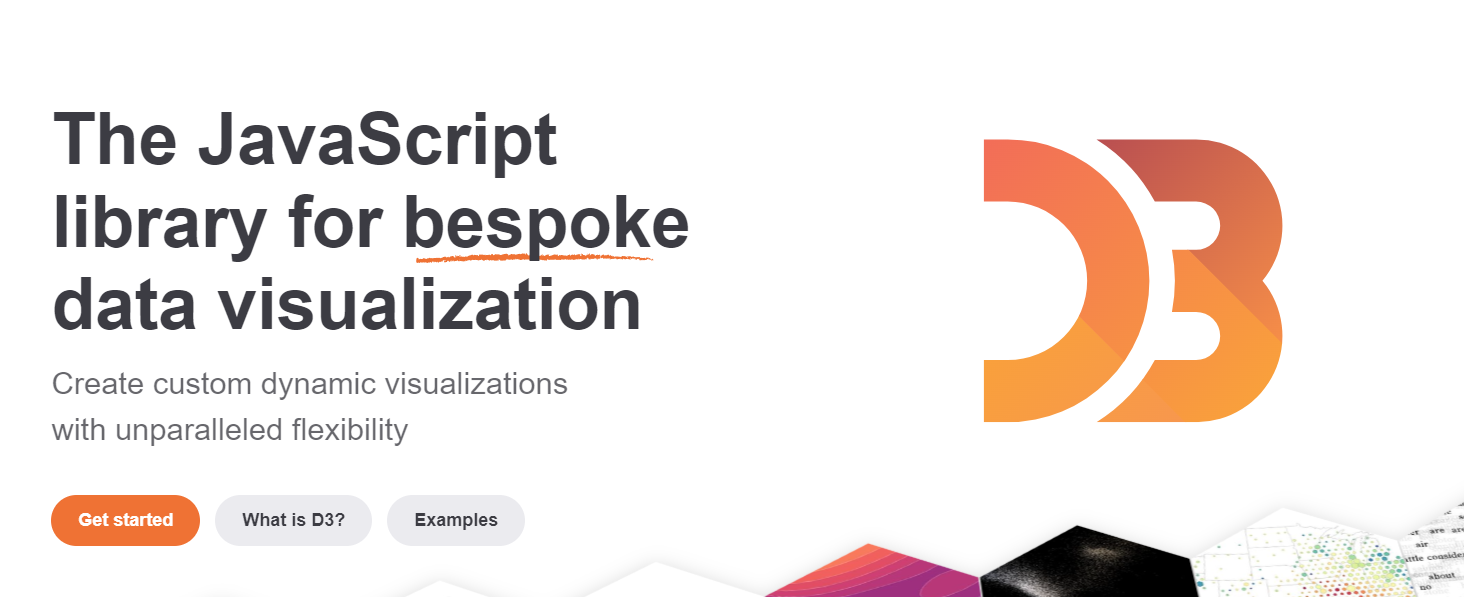
D3.js is a commonly used data visualization library in Java
Some project ideas for data analysis and visualization are:
- Analyzing social media sentiment on a particular topic or brand
- Predicting stock market trends using historical data
- Visualizing customer purchasing
Use the following cheat sheet to help you choose the right charts for your project.
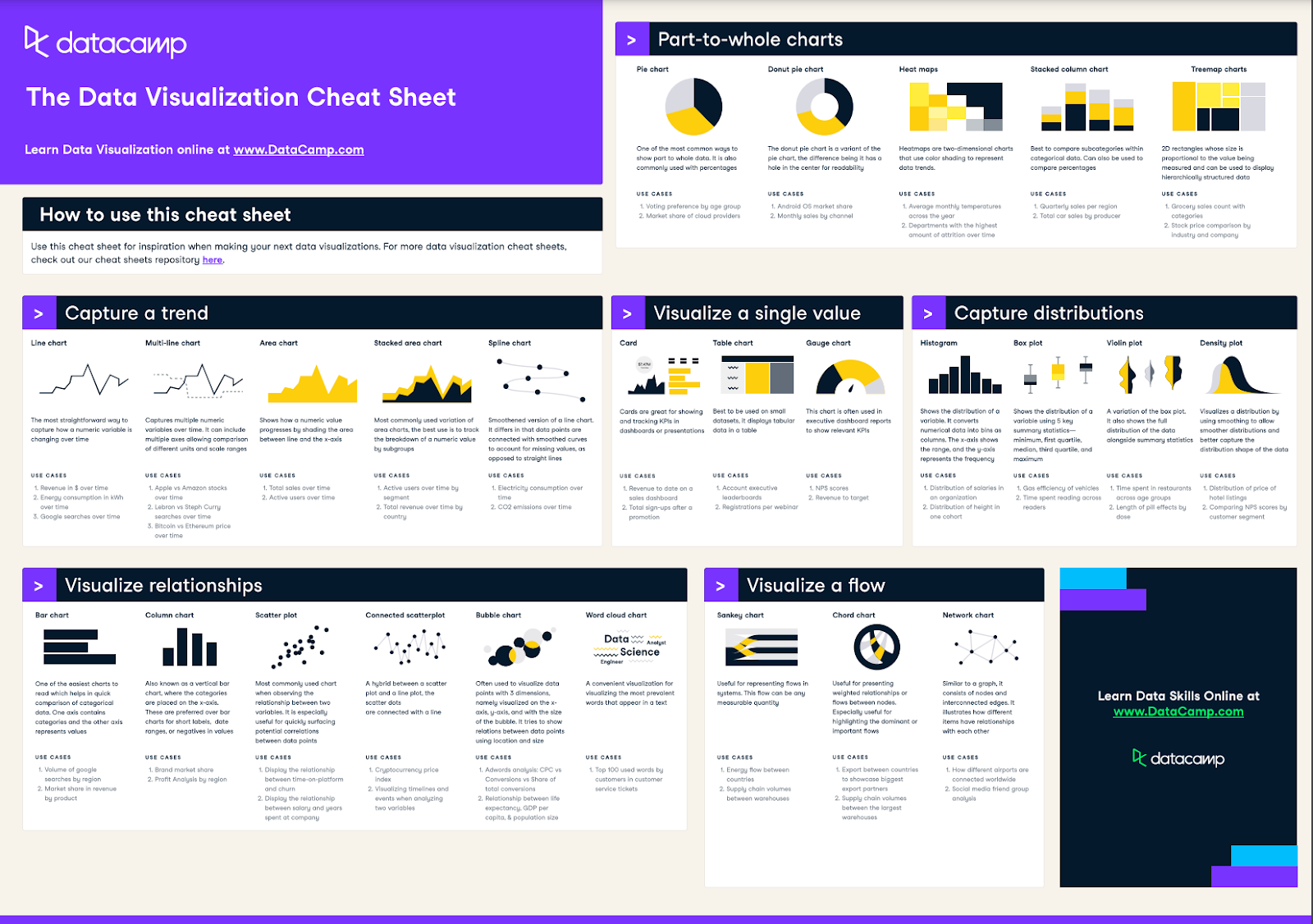
Source: Data visualization cheat sheet
14. Game development projects
If you have a passion for gaming, Java offers exciting opportunities in game development. You can create 2D and 3D games using Java libraries like LibGDX. Game development projects allow you to combine creativity with technical skills, resulting in engaging and entertaining applications.
This can be a fun project to work on, as well as a good conversation starter with your interviewer.
Open-Source Java Projects
Open-source projects are projects that are freely available for anyone to use, modify, and distribute. Contributing to open-source projects is an excellent way to improve your coding skills and give back to the community.
However, such contributions are usually made by more advanced Java users and are selected on a strict voting process.
Some Java open-source project ideas include:
- Contributing to Apache Maven as a Maven committer, a popular build automation tool used in many Java projects
- Adding features or bug fixes to Eclipse, a widely used integrated development environment (IDE) for Java
- Contributing to Elasticsearch, an open-source search engine built in Java, by addressing issues and bugs on their GitHub repository
Contributing to open-source projects can be a great way to build your coding resume and show your passion for Java to potential employers.
If you're eager to make a difference while improving your skills, and you have adequate experience in Java, consider contributing to one of these open-source projects.
Tools and Resources for Java Projects
Before you begin your Java project, let me introduce several resources that can help make the process smoother.
IDEs for Java development
For Java projects, you'll need an integrated development environment (IDE) to write, compile, and execute your code.
Some popular IDEs for Java include:
IntelliJ IDEA
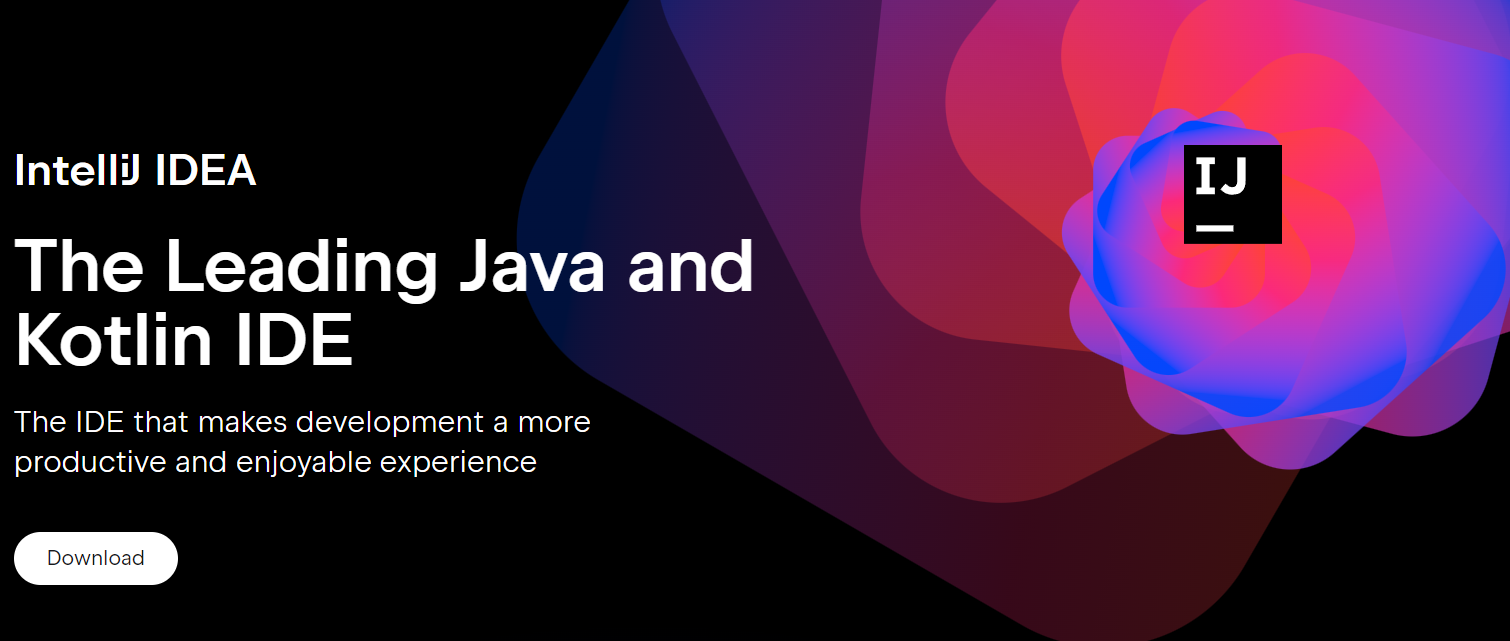
IntelliJ IDEA is an advanced IDE that supports various programming languages, including Java, and offers features like AI code generation, refactoring, and debugging. It also has a robust community edition that's free to use. This IDE is also the most commonly used one in industry.
Eclipse

Eclipse is a free and open-source IDE that's widely used for Java development. Eclipse also has various plug-ins available for additional functionalities. It is also used for other languages such as C++, Python, and PHP.
NetBeans
NetBeans is another free and open-source IDE that supports multiple programming languages, including Java. It has a user-friendly interface beyond a regular text editor and offers features like code templates, refactoring tools, and a drag-and-drop GUI builder.
VSCode
Visual Studio Code is a lightweight, open-source code editor that supports Java and many other programming languages. With extensions like Java Extension Pack, VSCode can offer almost the same features as a full-fledged IDE.
Java libraries and frameworks
Java has a vast ecosystem of libraries and frameworks that can make your project development faster, easier, and more efficient. Some popular ones include:
Spring
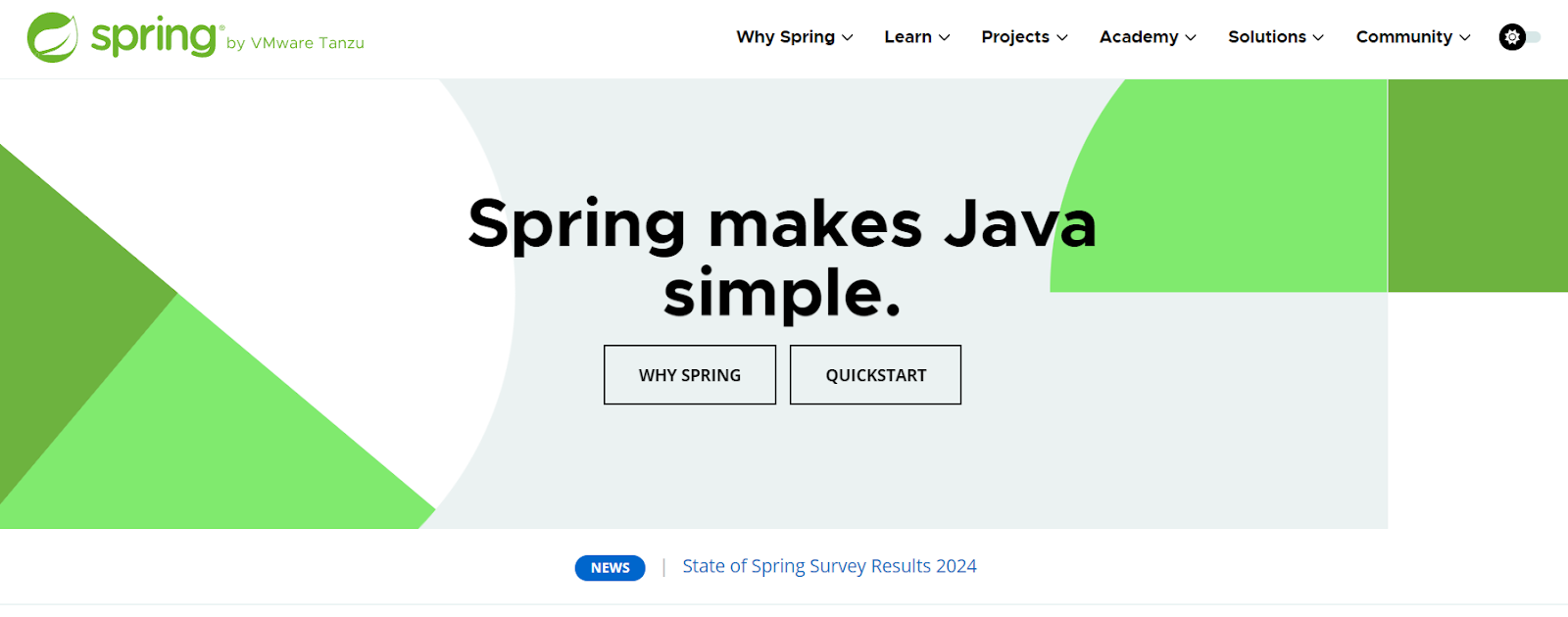
Spring is an open-source framework for building enterprise-level applications in Java. It offers features like dependency injection, web MVC, and integration with other frameworks like Hibernate.
Hibernate
Hibernate is a popular open-source object-relational mapping framework for Java. It simplifies the interaction between your Java application and the database, making it easier to store, retrieve, and manipulate data.
Apache Struts
Apache Struts is a framework for developing web applications in Java. It is based on the popular Model-View-Controller (MVC) design pattern, which helps to separate the presentation layer from the business logic.
Online resources and communities
To help you learn and overcome challenges during your project development, you can also turn to online resources and communities such as:
- Stack Overflow, a popular question-and-answer forum for programming-related topics
- GitHub, a platform for hosting and collaborating on software projects, where you can find many open-source Java projects and contribute to them.
Here are some additional resources to learn:
However, I would recommend having a structured format of learning, like through an online course to guide you through the proper coding structures and practices.
If that's what you prefer, our Introduction to Java course is the perfect place to begin. Alternatively, if you're looking for a more interactive learning approach, you can watch the Getting Started with Java for Data webinar as well.
Conclusion
Java projects are invaluable for developers to grow their skills, build impressive portfolios, and advance their careers. These projects should help you get started and provide you with the necessary tools and resources to succeed.
Want to take your Java to the next level, but don't know how to begin? The Introduction to Java course would be your best bet.
Java Projects FAQs
What should be my first Java project?
For beginners, it is recommended to start with a simple project such as a calculator or a guessing game. This will help you get familiar with basic Java concepts and syntax.
Which platform is best for Java projects?
There are many platforms available, but some popular choices include IntelliJ IDEA, Eclipse, and NetBeans.
Which framework should I learn first in Java?
You should learn the Spring framework first because it is most commonly used and is lightweight. Some other popular frameworks include Hibernate and Apache Struts.
Should a beginner start with Java?
A beginner can start with Java, as it provides a strong foundation of programming due to its strict and clear rules. It also has a decent demand for Java programmer jobs.
What are real-time projects in Java?
Real-time projects in Java are applications that are developed to run and produce results in live, without any delay. These projects often involve, getting live data from APIs, complex algorithms and require a strong understanding of Java programming concepts.

I'm Austin, a blogger and tech writer with years of experience both as a data scientist and a data analyst in healthcare. Starting my tech journey with a background in biology, I now help others make the same transition through my tech blog. My passion for technology has led me to my writing contributions to dozens of SaaS companies, inspiring others and sharing my experiences.

